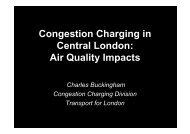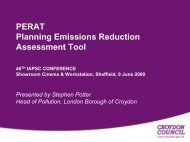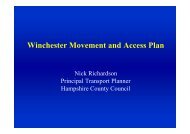Cars and behaviour: psychological barriers to car restraint ... - iapsc
Cars and behaviour: psychological barriers to car restraint ... - iapsc
Cars and behaviour: psychological barriers to car restraint ... - iapsc
You also want an ePaper? Increase the reach of your titles
YUMPU automatically turns print PDFs into web optimized ePapers that Google loves.
<strong>to</strong> encourage fuel effiency through fiscal incentives, but unfortunataly it fails <strong>to</strong> identify engine<br />
downsizing <strong>and</strong> in-<strong>car</strong> feedback instruments as a "no regret" approach.<br />
The question therefore needs <strong>to</strong> be addressed: what single or combined measures should be taken <strong>to</strong><br />
achieve the "downgrading" of market trends <strong>and</strong> the downsizing of power <strong>and</strong> performance? Four<br />
different but related approaches can be distinguished:<br />
A) social-<strong>psychological</strong> instruments, such as communication <strong>and</strong> education;<br />
B) fiscal <strong>and</strong> economic incentives;<br />
C) covenants or voluntary agreements with manufacturers;<br />
D) (international) regulations, directives <strong>and</strong> st<strong>and</strong>ards.<br />
A brief survey of these different instruments suggests that instrument A) cannot be considered<br />
effective, given current market preferences <strong>and</strong> "au<strong>to</strong>-cultural" values. The measures under B) <strong>and</strong> C)<br />
are favoured as an alternative <strong>to</strong> D) <strong>and</strong> can be highly effective once industry supports a target or a<br />
deal. But this will not happen in the foreseeable future, given current market preferences <strong>and</strong> the low<br />
oil prices <strong>and</strong> the promise of abundant future supplies, at least in the medium term. Thus the<br />
regula<strong>to</strong>ry approach seems inevitable if politicians have the courage <strong>to</strong> promote stricter fuel efficiency<br />
<strong>and</strong> road safety at the expense of the current emphasis on performance. However, even if this were <strong>to</strong><br />
happen, we should not harbour any illusions about the resistance which limiting the power-<strong>to</strong>-weight<br />
ratios or performance of <strong>car</strong>s will provoke. The "<strong>car</strong>-industrial-cultural complex" is likely <strong>to</strong> prevent any<br />
such approach from being embodied in directives until serious oil crises arrive. It must be concluded<br />
that it is the <strong>car</strong> industry that holds the key <strong>to</strong> any effective implementation of downgrading, be it<br />
voluntary or regula<strong>to</strong>ry. In view of Kyo<strong>to</strong> <strong>and</strong> the long way <strong>to</strong> go, the first steps should now be taken by<br />
the OECD <strong>and</strong> EU member countries <strong>to</strong>wards a comprehensive set of measures, starting with "no<br />
regret" measures <strong>and</strong> shifting <strong>to</strong> more unpopular <strong>and</strong> painful ones, as set out below:<br />
A. Tax measures should be introduced <strong>to</strong> encourage purchase <strong>and</strong> ownership of compact <strong>and</strong><br />
economical <strong>car</strong>s <strong>and</strong> discourage purchase <strong>and</strong> ownership of powerful, heavy <strong>and</strong> uneconomical<br />
<strong>car</strong>s. Such measures are currently being prepared in the Netherl<strong>and</strong>s.<br />
B. CO2 emission st<strong>and</strong>ards <strong>and</strong> fuel consumption st<strong>and</strong>ards should be formulated for relevant<br />
vehicle size classes, <strong>and</strong> regularly tightened up. CO2 st<strong>and</strong>ards need <strong>to</strong> prevent market<br />
reactance <strong>to</strong> upgrading, so fleet-average efficiency st<strong>and</strong>ards need <strong>to</strong> be incorporated as well.<br />
St<strong>and</strong>ards can be set voluntarily or by EU directives.<br />
C. Econometers, board computers <strong>and</strong> cruise control devices should be fitted as a st<strong>and</strong>ard in-<strong>car</strong><br />
instrument that supports drivers in safe <strong>and</strong> fuel-efficient driving.<br />
D. Speed limits should be enforced continuously <strong>and</strong> effectively so as <strong>to</strong> reduce real vehicle<br />
speeds <strong>and</strong> <strong>to</strong> improve driver's awareness of speed <strong>and</strong> fuel consumption. Current speed limits<br />
should be lowered <strong>to</strong> the levels where <strong>to</strong>tal costs/benefits <strong>to</strong> society are optimal: 90 or 100<br />
km/hour on highways (LDV only; HDV: 80 km/h).<br />
E. Speed limiters should be fitted not only <strong>to</strong> goods vehicles <strong>and</strong> buses but also <strong>to</strong> mo<strong>to</strong>rcycles,<br />
private <strong>car</strong>s <strong>and</strong> delivery vans, as a transitional measure <strong>to</strong>wards the limitation of power ratings<br />
in all vehicles.<br />
F. Power-<strong>to</strong>-weight ratios <strong>and</strong> the performance of passenger <strong>car</strong>s, mo<strong>to</strong>rcycles <strong>and</strong>, <strong>to</strong> a lesser<br />
extent, goods vehicles <strong>and</strong> buses should be limited within a tiered stepping-up time table for<br />
2000, 2005, etc.<br />
References<br />
1. Towards road safety <strong>and</strong> sustainability; National traffic safety survey for the years 1990/2010<br />
(SWOV, Leidschendam, NL; 1992).<br />
2. "Just a bit less speedy"; cost-benefit analysis of reducing speeds on the road<br />
network in the Netherl<strong>and</strong>s. Working Group 2Thous<strong>and</strong>/Free University of Amsterdam/Delft<br />
Technical University (1996).<br />
3. Special emission measurements; VITO, Mol (Belgium), <strong>and</strong> IW-TNO 1992 report no.










